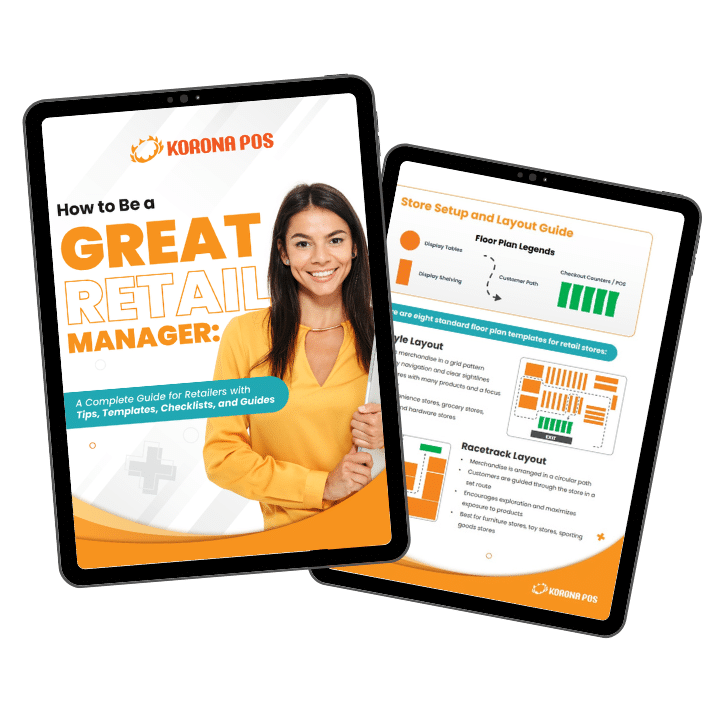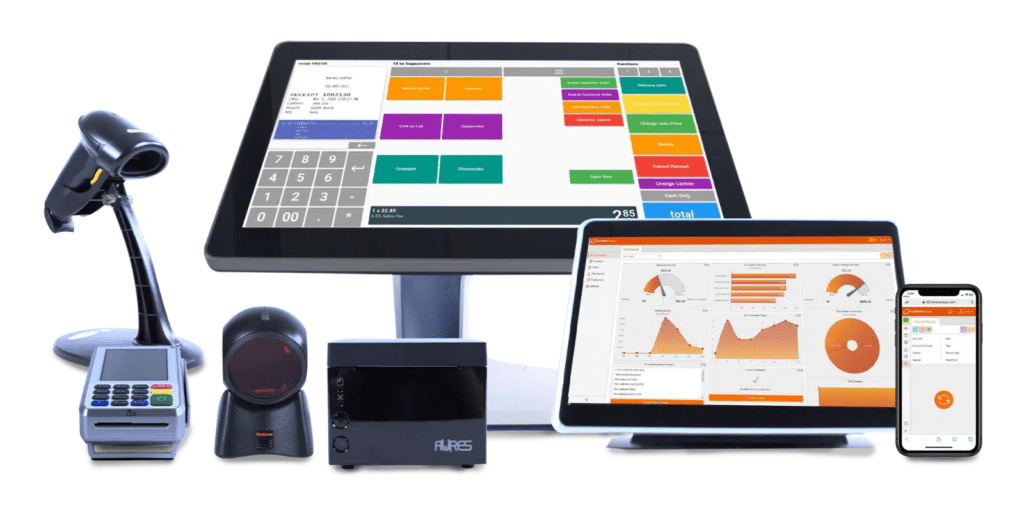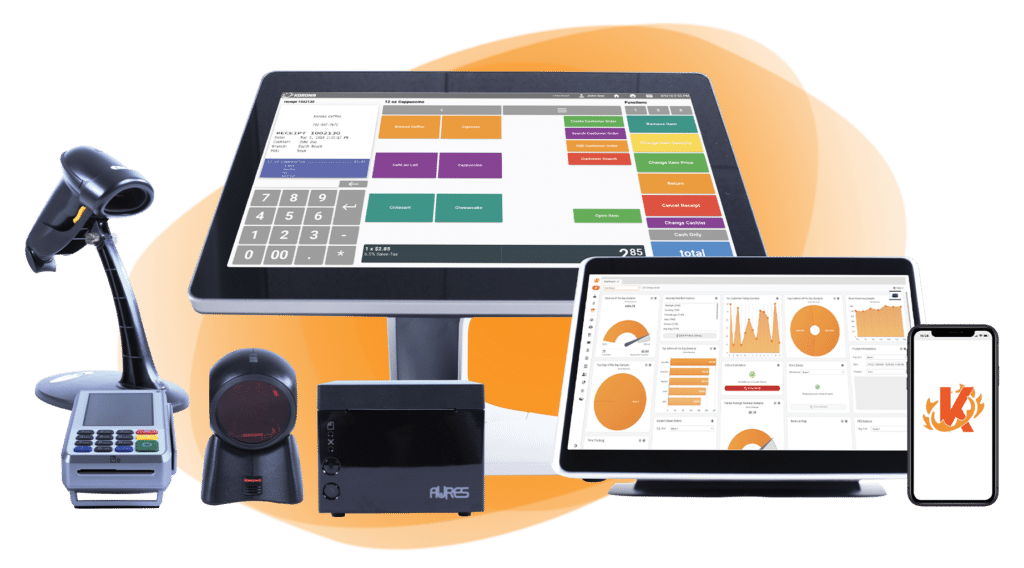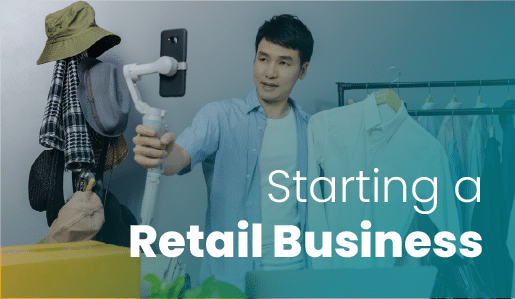Thinking of starting a retail business? That makes you one of thousands of new entrepreneurs setting up shop every year. But without a clear roadmap, it’s easy to waste time and money.
This step-by-step guide covers how to start a retail business in 12 actionable steps, from choosing your idea to hiring staff and optimizing your store’s operations. Let’s dive in.
Key Takeaways:
- To open a retail business, you must first choose a niche and retail format that aligns with your skills, interest, and local demand.
- Write a business plan that includes startup costs, pricing strategy, and revenue projections.
- Legally register your business, obtain permits, and secure insurance to minimize risk.
- Finally, use tools like POS systems, staff training, and supplier management to build out your operation.
How to Start a Retail Business in 12 Steps
Starting a retail business involves more than picking a product to sell and opening your doors. From market research to operations, every step matters. Let’s break down exactly what you need to do.
Step 1: Choose Your Retail Business Idea
The first step is to figure out what kind of retail business you want to start. Begin by reflecting on your interests, skills, and local demand. Then dig into the financial viability.
Identify your interests and strengths
Think about what products or services you’re passionate about or knowledgeable in. Your enthusiasm will motivate you, and your expertise will help you better serve customers.
Assess profitability
Research market demand, typical pricing, and profit margins in your chosen niche. Tools like Google Trends and industry reports can help you avoid costly mistakes.
Study the competition
Analyze local and online competitors. Identify what they do well and where you can offer something unique or better.
Retail Type | Pros | Challenges |
Antique Shop | Unique inventory, niche audience, low direct competition | Sourcing quality items, unpredictable demand |
Bike Shop | High-ticket items, potential for repairs and rentals | Seasonal sales, specialized knowledge required |
Book Store | Strong community appeal, events and partnerships boost visibility | Competing with eCommerce giants, low profit margins |
CBD Store | Fast-growing market, loyal customers | Complex legal regulations, payment processing limitations |
Convenience Store | Steady foot traffic, essential goods always in demand | Low margins, long operating hours |
Dispensary | High profit potential, growing legalization trend | Intense regulation, security and licensing hurdles |
Hardware Store | Consistent demand, opportunities for repeat business | Large inventory and space requirements, competition from big-box retailers |
Liquor Store | High-demand products, upselling potential | Licensing requirements, theft prevention |
Smoke Shop | High-margin accessories, consistent customer base | Regulatory pressure, limited advertising options |
Thrift Store | Sustainable appeal, low-cost inventory (often donated) | Inventory inconsistency, sorting and organizing labor-intensive |
Winery | Premium branding opportunities, wine tastings/events | High startup costs, seasonal limitations |
Vape Shop | Strong demand among younger demographics | Regulatory scrutiny, product liability concerns |
Step 2: Write a Business Plan
A solid business plan is the blueprint that guides every aspect of your retail store. Whether you’re self-funding or seeking investment, a clear plan is essential.
✅ Plan your marketing
Outline how you will attract and retain customers. Consider social media, local events, email marketing, and online ads.
✅ Forecast finances
Estimate your startup costs and ongoing expenses. This includes rent, inventory purchases, employee wages, and necessary technology or software subscriptions.
Step 3: Register Your Business
Registering your business legally establishes your company as a recognized entity. This protects your personal assets and allows you to operate lawfully, apply for permits, and pay taxes correctly.
✅ Choose and register a name
Pick a memorable name that reflects your brand. Check availability with your local business registry and register your domain online.
✅ Pick your legal structure
Decide if your business will be a sole proprietorship, LLC, or corporation. Register with the appropriate state and federal agencies to get your EIN and permits.
Step 4: Get Licenses, Permits, and Insurance
Operating legally requires securing the necessary licenses and permits specific to your location and industry. Insurance protects your business against liabilities, property damage, and unforeseen events.
Pro Tip!
Before launching, contact your local Small Business Development Center (SBDC) or city clerk’s office—they can help you identify exactly which permits, licenses, and insurance types you’ll need for your specific business type and location
Step 5: Find a Retail Location
Whether you want a brick-and-mortar store or an online presence, your “location” plays a crucial role.
✅ Analyze locations
Consider foot traffic, accessibility, rent prices, and local zoning laws. A great location increases walk-in customers and sales.
✅ Launch online if needed
If a physical store isn’t feasible, build an eCommerce presence with platforms like Shopify or WooCommerce to reach customers everywhere.
Pro Tip!
You may want a hybrid retail store with a physical location and an online store. If that’s the case, choose a POS system like KORONA POS that allows you to easily take your store online.
Step 6: Choose and Manage Retail Suppliers
Reliable suppliers keep your store stocked with quality products. It’s up to you to source the best inventory and maintain healthy relationships to ensure a consistent supply.
✅ Source inventory
Build relationships with trusted suppliers by attending trade shows, using wholesale platforms, or partnering with local artisans.
✅ Track and evaluate
Consistently monitor supplier reliability in delivery times and quality. Then, use inventory management tools to avoid stockouts or dead stock.
Step 7: Hire and Train Staff
Your staff are the face of your business. Hiring the right people and providing clear training will build a motivated and efficient staff that supports your business from the ground up.
✅ Define roles and responsibilities
Create clear job descriptions outlining duties, skills, and expectations for each position.
✅ Develop a training program
Train employees on your POS system, customer service standards, product knowledge, and store policies.
✅ Implement onboarding checklists
Use checklists to ensure new hires complete all necessary training and paperwork for a smooth integration onto the team.
Step 8: Invest in a POS System
It’s time to set up your POS system. Choose a reliable point-of-sale system that simplifies transactions and gives you unlimited access to valuable business insights.
✅ Select a cloud-based POS
Opt for scalable, cloud-based solutions like KORONA POS that support multi-store, real-time inventory management and POS data tracking, and mobile access from anywhere.
✅ Integrate inventory management
Use POS features to automate stock updates and get alerts when your inventory is low.
✅ Utilize sales analytics
Leverage retail sales analytics like a daily sales report or sales per square foot calculation to monitor sales trends, peak hours, and employee performance. KORONA POS’s retail KPI dashboard can help you calculate and analyze a list of key performance indicators (KPIs), all at the click of a button.
Step 9: Set Up Store Layouts & Displays
Your retail environment and layout influence how customers navigate and shop in your store. Thoughtful displays will encourage customers to buy while creating an inviting atmosphere.
✅ Design a customer-friendly floor plan
Arrange your floor plan with aisles and product sections that allow easy flow and visibility.
✅ Highlight high-margin products
Place popular and profitable items at eye level and near checkout areas so they’re right in your shopper’s line of sight.
✅ Use signage and lighting strategically
Guide customers around your store with clear signs and spotlight promotions with focused lighting.
Step 10: Launch Your Marketing Strategy
Marketing is essential to attract and retain customers. Create campaigns that build your brand presence and generate traffic both online and offline.
✅ Create a Google Business Profile
Improve local search visibility and share important info like hours and location.
✅ Build a social media presence
Engage customers with posts, stories, and promotions on relevant platforms.
✅ Run promotions and events
Host grand openings, seasonal sales, and loyalty programs to boost foot traffic and sales.
✅ Collect customer contact info
Strong customer relationship management will keep shoppers coming back for more. Start building an email and SMS list for direct marketing campaigns.

Free printable templates and checklists to help you manage retail operations with ease
Step 11: Monitor Your Finances
Keep your business financially healthy by regularly reviewing your income and expenses, managing cash flow, and adjusting your budgets as needed.
✅ Use accounting software
Use QuickBooks, Xero, or similar tools to easily keep track of sales, expenses, and payroll. These user-friendly programs help you stay organized and manage your business finances smoothly.
✅ Review profit and loss statements monthly
Analyze your revenue versus your costs to find opportunities for growth and identify potential risks. This can help you make better financial decisions and plan for the future.
✅ Monitor inventory shrinkage
Investigate discrepancies between inventory counts and sales to identify potential causes of shrinkage and reduce overall loss.
Step 12: Optimize Store Operations
The work is just starting—now it’s time to shift the focus to growing your retail business. Continuously improving your retail store performance keeps your business competitive and responsive to customer needs.
✅ Hold regular team meetings
Engage with your staff by discussing current challenges, sharing important updates, and aligning everyone on common goals to improve teamwork and productivity.
✅ Gather customer feedback
Conduct surveys, review feedback, and hold direct conversations to identify effective strategies and areas needing improvement.
✅ Analyze sales data for decisions
Modify the store’s hours, staffing, product selection, and pricing strategies according to key performance metrics for optimal efficiency. The right retail operations software will make this a breeze.
Discover Advanced Analytics and Custom Reports
Speak with a product specialist and learn how KORONA POS can work for your business.
Challenges of Starting a Retail Business
While launching a retail business is rewarding, it comes with hurdles every new entrepreneur should prepare for. From upfront costs to staffing, here are some common challenges and how to navigate them.
Challenge #1: High Startup Costs
Opening a retail store can be expensive when you factor in inventory, rent, licenses, staffing, and equipment. You can start by budgeting carefully and prioritizing only essential retail store equipment to reduce the cost of money.
Challenge #2: Managing Inventory and Daily Tasks
Without a system in place, tracking stock levels, reorders, and day-to-day operations can be complex. A retail POS kit can simplify inventory tracking and streamline checkout processes.
Pro Tip!
Use a daily retail store checklist to keep your operations organized and running smoothly.
Challenge #3: Training and Retaining Staff
Hiring qualified staff is just the start—keeping them engaged and well-trained is an ongoing effort. Learn how to manage your retail store efficiently with training tools and performance metrics.
Challenge #4: Adapting to Changing Trends
Staying competitive means keeping up with consumer behavior, tech innovation, and industry standards. Track emerging retail trends to stay ahead of the curve and adjust your offerings and operations accordingly.
Challenge #5: Standing Out
With so many retail options, differentiating your store can be tough. Focus on building community and offering personalized experiences to rise above the noise, and use your POS system data to uncover what keeps customers coming back.
Simplify Your Retail Operations with KORONA POS

Running a retail business is rewarding—but complex—and the right technology can remove much of the daily friction and help you scale. KORONA POS supports you at every stage, from opening day to multi-location growth.
Track your inventory, manage staff, automate reports, and create seamless customer experiences from one platform. That’s how you keep your retail business thriving, from opening onwards.

Build Your Own POS
Whether you run a retail store, café, or admissions booth, we have the point of sale hardware designed for your specific needs. Start building your ideal POS system now.
FAQs
Do I really need a retail POS system from day one?
Yes. Starting with a solid POS system ensures smooth transactions, real-time inventory tracking, and valuable business insights.
How important is foot traffic when choosing a retail store location?
Foot traffic is extremely important—it influences how many people discover and enter your store. Evaluate traffic data before signing a lease.











